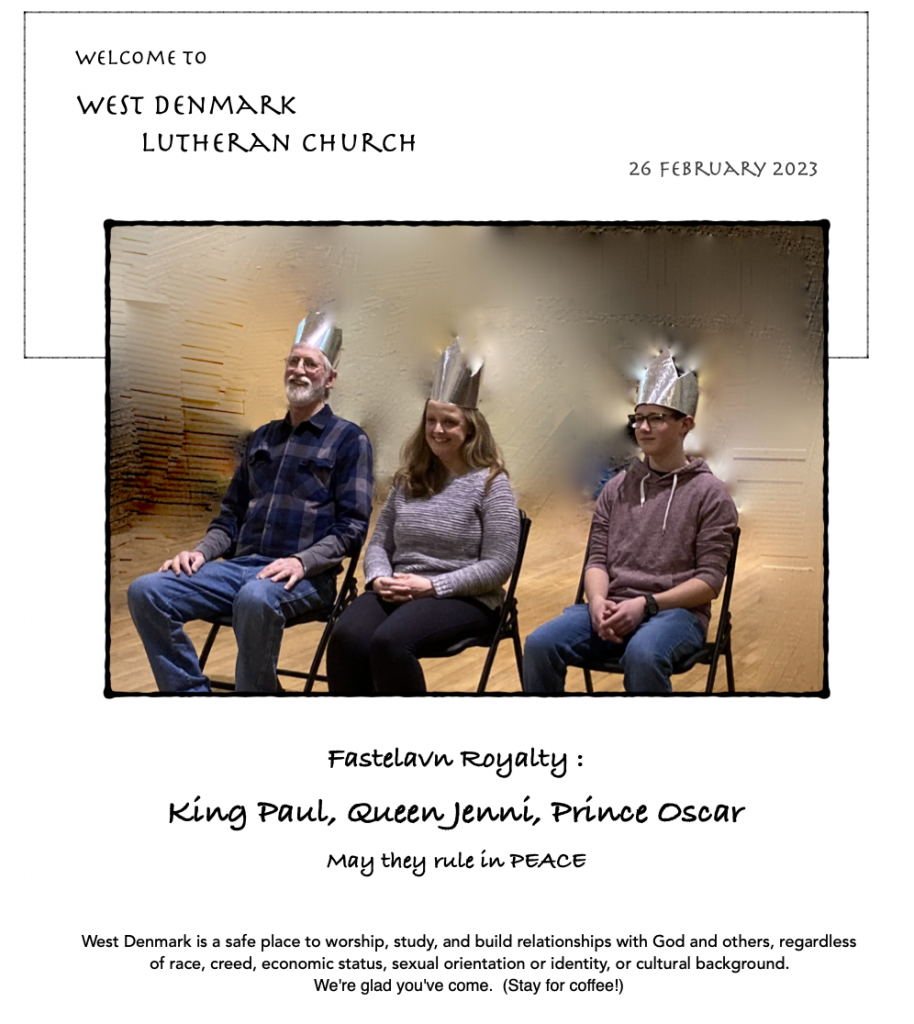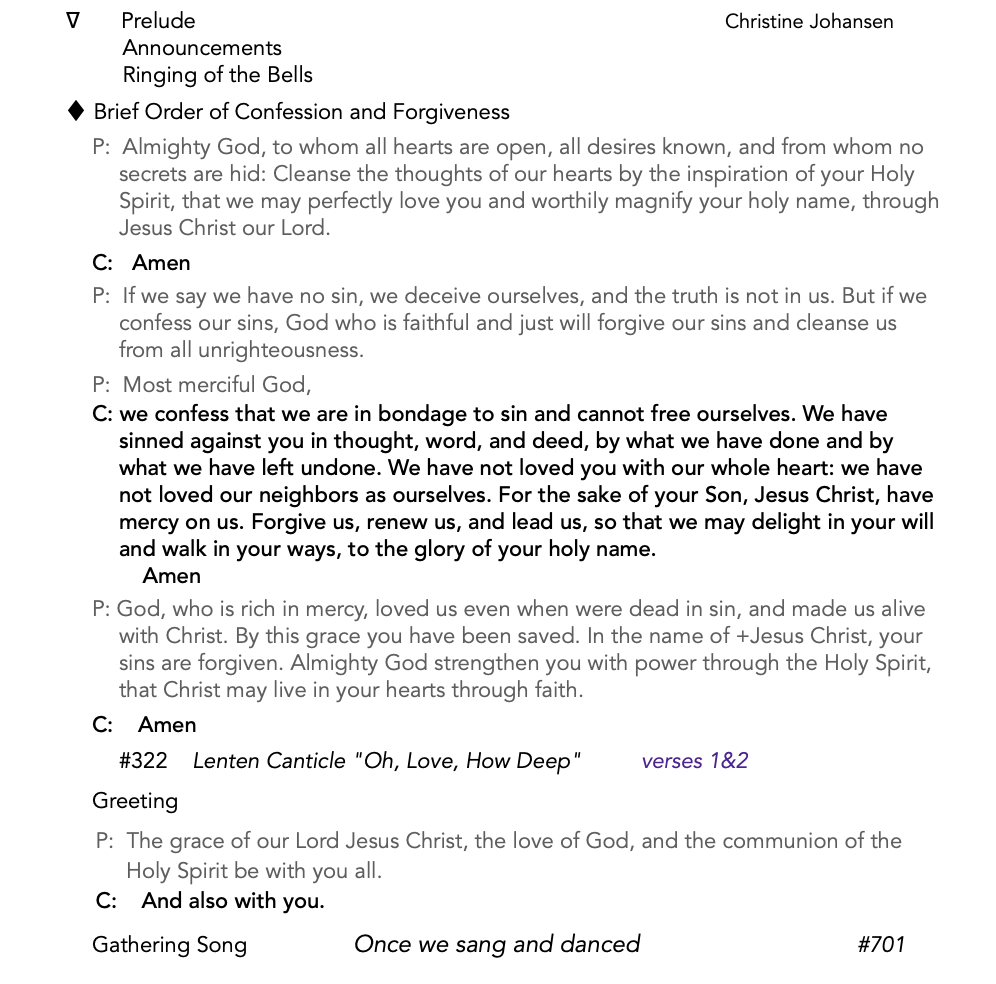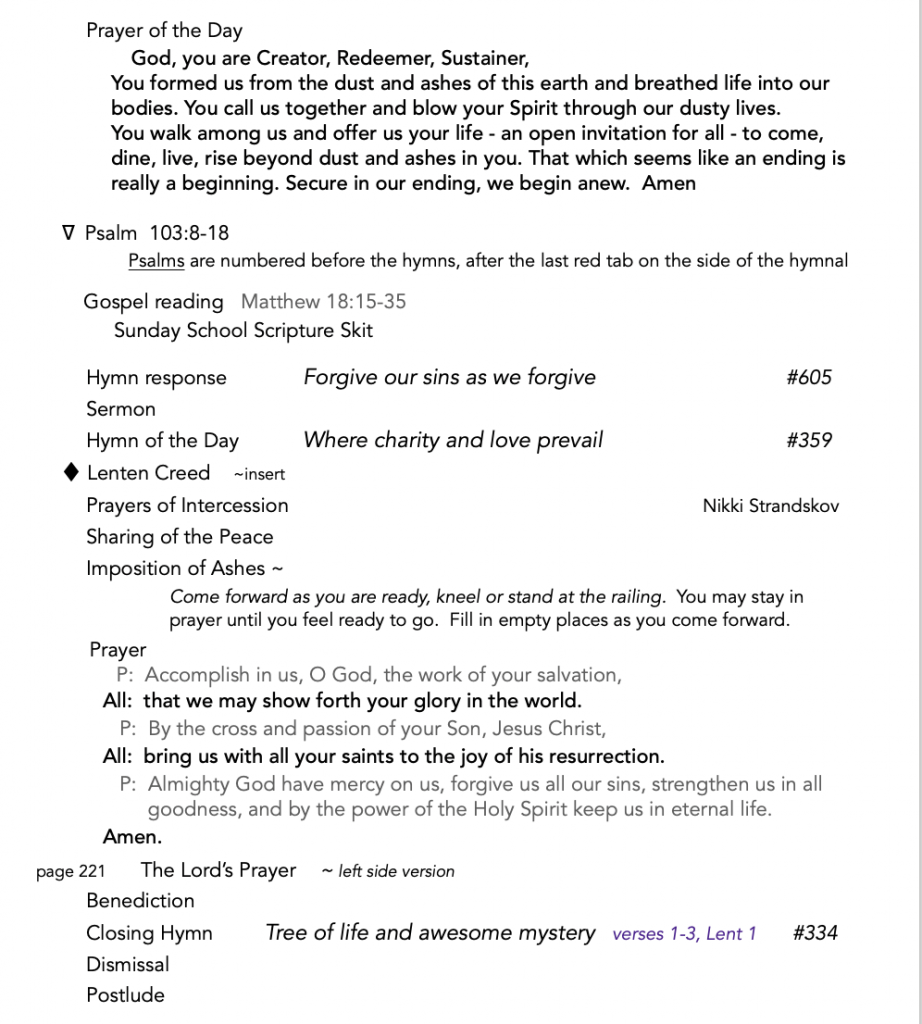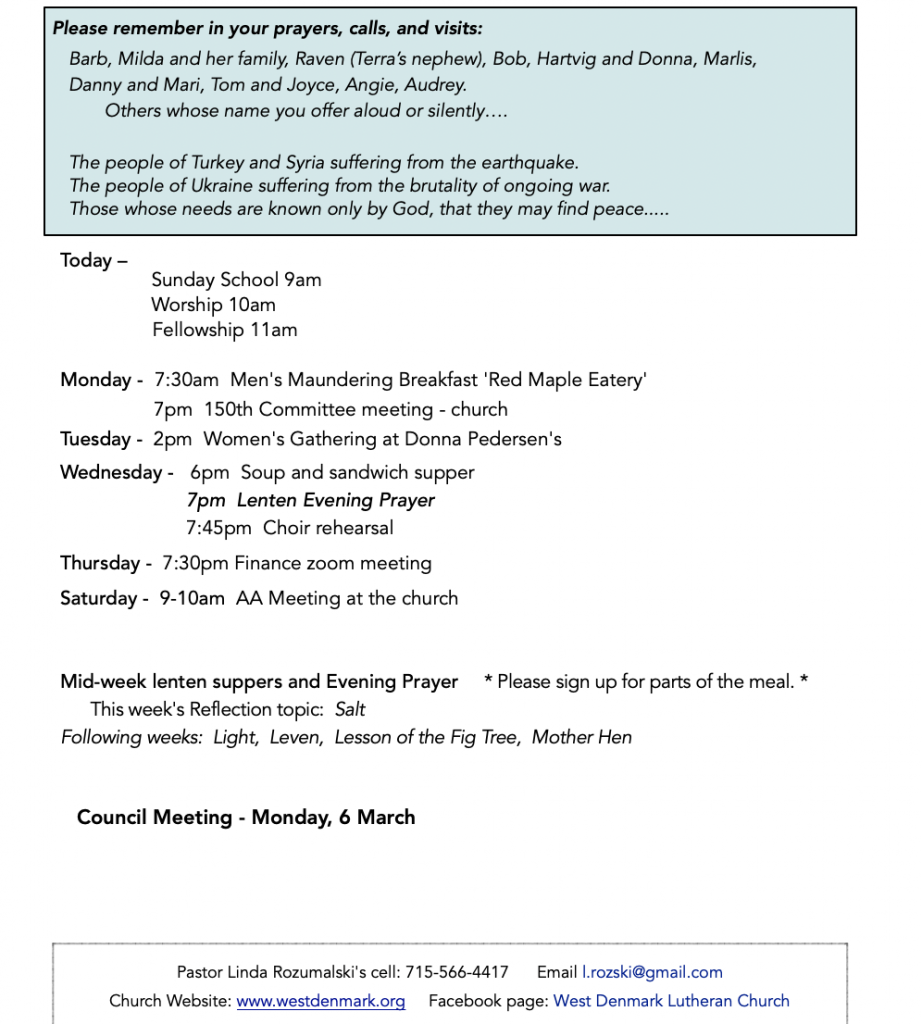Audio Recording



Each Sunday in Lent the narrative lectionary gives us a parable. Today’s parable on forgiveness is accompanied by a practical application.
The gospel according to Matthew, the 18th chapter :15-35
“If another member of the church sins against you, go and point out the fault when the two of you are alone. If the member listens to you, you have regained that one. But if you are not listened to, take one or two others along with you, so that every word may be confirmed by the evidence of two or three witnesses. If the member refuses to listen to them, tell it to the church; and if the offender refuses to listen even to the church, let such a one be to you as a Gentile and a tax collector. Truly I tell you, whatever you bind on earth will be bound in heaven, and whatever you loose on earth will be loosed in heaven.
Again, truly I tell you, if two of you agree on earth about anything you ask, it will be done for you by my Father in heaven. For where two or three are gathered in my name, I am there among them.”
Then Peter came and said to him, “Lord, if another member of the church sins against me, how often should I forgive? As many as seven times?” Jesus said to him, “Not seven times, but, I tell you, seventy-seven times. “Therefore the kingdom of heaven has become like a king who wished to settle accounts with his slaves. When he began the reckoning, one was brought to him who owed him ten thousand talents; and, as he could not pay, his lord ordered him to be sold, together with his wife and children and all his possessions, and payment to be made.”
But you don’t need to take my word for it….
Sunday School Skit
But the slave fell on his knees before him, saying, ‘Have patience with me, and I will pay you everything.’ And being moved by compassion, the lord of that slave released him and forgave him the debt.
But that same slave, as he went out, came upon one of his fellow slaves who owed him a hundred denarii; and seizing him by the throat, he said, ‘Pay what you owe.’ Then his fellow slave fell down and pleaded with him, ‘Have patience with me, and I will pay you.’ But he refused and went and threw him in prison until he would pay the debt. When his fellow slaves saw what happened, they were greatly distressed, and they went and reported to their lord all that had taken place.
Then the king summoned him and said to him, ‘You wicked slave! I forgave you all that debt because you pleaded with me. Should you not have had mercy on your fellow slave, as I had mercy on you?’ And in anger his lord handed him over to be tortured until he would pay his entire debt.
“So also my heavenly Father will do to every one of you, if you do not forgive your brother or sister from your heart.”
The gospel of the Lord…thanks be to God
Today’s reading begins with the church handbook on how to deal with adversarial or conflicted relationships. It’s good, practical advice for disagreements that are bound to arise in any close community: begin with the source with your complaints, don’t triangulate someone else in or spread your complaint out into the neighborhood – face disagreements head on – face to face, forthrightly, and with humility and honesty.
If that doesn’t work, bring in an arbitrator who can hear both sides fairly, who will point out the faults and highlight the similarities in the two positions. And then, if that fails, inform the community: draw on their strength and communal wisdom to help you process the argument and come to peaceful terms – even if it is disagreement. And if even then, harmony can’t be restored, turn your collective backs and close the door.
That’s what we hear – and usually practice as a first or second step – kick the offender out, lop off the offending part, pluck out the eye that causes you to sin. Matthew offers a lot of suggestions for alienation. But, actually, Jesus didn’t say that. He says, “and if the offender refuses to listen even to the church, let such a one be to you as a Gentile and a tax collector.”
Oh. And how did Jesus treat Gentiles and tax collectors? Oh.
In Luke’s gospel, Zacchaeus is a tax collector. And when Jesus calls him down from the sycamore tree, Jesus invites himself over for dinner. He even called a tax collector to be a disciple – the disciple named Matthew. Hmmm.
So… when irreconcilable differences occur, for the sake of order within the ecclesia, the church, the offender should be excluded from the gathering, but invited into personal relationship, invited into dialog, invited to lunch. It seems that Jesus is recognizing the ripples of trouble internal hostility or discord can create, but is still committed to, or at least hoping for, reconciliation one-to-one by continuing the mission of Love to that person.
We aren’t very good at any of this. It’s so much easier to sever ties, to turn away and not step into the murky depths of conflict. Approaching someone who’s angry with humility and soul searching is uncomfortably vulnerable. We don’t have models for this behavior.
The only leverage that changes attitudes and opinions is love. The other person might not love you or you them, but love has to be in the mix, it has to find a crack to shine through. When have you really changed your mind about someone or some ‘category’ of people? When have you been swayed to understand an opposing viewpoint? When have you felt safe enough to let down your guard and let the hard candy outer shell melt? I’m willing to bet love was involved. Compassion, empathy, mercy, forgiveness – they all flow from a place of vulnerable love.
Matthew was talking specifically about the church community. This is the only time the word ecclesia is used in the gospels – it’s the word for the Christian Jewish worship, not synagog or temple. And gives us a sense of the struggles his community was dealing with. We don’t know the specifics of that – at all – but the challenge and practice of forgiveness is universal. We do know about that.
“Forgive our debts and we forgive our debtors.” “Forgive us our trespasses as we forgive those who trespass against us.” Or sin. Whichever version we use, the order is the same.
I imagine you might have noticed and puzzled over the order of these words in the Lord’s Prayer. Proper Lutheran theology would turn them around: “Grant us grace to forgive, as we have first been forgiven.” The way the prayer is written sounds as if our forgiven-ness is based on our practice of forgiving – similar to the warning from a couple of weeks ago, that the judgment you give is the judgment you will receive.
The parable Jesus tells goes both ways. The king forgave a ginormous debt, expecting the slave to forgive one who owed him a small debt, out of gratitude for what the king had just done. However, when the slave fails to offer the same clemency, the king is filled with rage and throws him into prison for the rest of his miserable days. So, this isn’t good news of great joy.
Jesus’ answer to Peter’s question doesn’t fit the parable. Peter wonders where we draw the line in the sand of forgiveness? How many times? How do we distinguish mercy from enabling someone to continue in their abusive behavior? According to the king, there needs to be acknowledgment and gratitude and repentance – changed behavior and an outflowing of the internalized mercy. According to what Jesus tells Peter, you need a calculator and a tally sheet. Forgiveness just goes on and on and on.
I’m trying to like Matthew’s gospel. I’ve been reading all kinds of stuff looking for insight and answers to my confusion. One thing I’ve read is helpful. Matthew is trying to answer the question, “How then shall we live?”
Jesus came into the public eye, taught with wisdom and authority, wowed the crowds and created enemies, healed diseases and illness and broken lives, gave value to people – people who were mostly unseen and unvalued. He was killed brutally, buried. The story Matthew has received is that this Jesus rose from death and was seen, interacted with his disciples and others and, like Elijah rose bodily to return to God. And still, Jerusalem was leveled, Rome is in charge, Jews and Christian Jews are persecuted sporadically and have spread out from Jerusalem like spokes from a wheel. There was talk of signs and wonders, but life is still life in the Empire.
There was no instruction book for how to live in the way of Jesus. There were just stories and a handful of letters from Paul that somehow made their way around to the churches, but not as a volume or collection. Each community was struggling to live according to what they remembered and were told was significant about Jesus’ teachings, how that teaching and story blended with the Jewish scriptures and practices, how they should be adapted to welcome in pagans and Gentiles and even tax collectors? Where do we go from here? What are we to do? How do we live into the kingdom of heaven that seems to be the size of a mustard seed? What difference does Jesus make in a multicultural, pluralistic, many faith-ed world of first century Asia Minor?
How then shall we live?
Matthew can’t present a systematic theology of Jesus, because there wasn’t one. He put things together that maybe didn’t fit together, because that’s what they had, what they remembered, what seemed important to hold onto. And the differences, or contrasts, or rubbing points were allowed to stand. Because the truth is that there isn’t a smooth story about Jesus, and there isn’t a single path. And the point of community is to bring all the pieces together, like a jigsaw puzzle: bringing the needs and joys and conflicts and insights and hope and vision and workers all together into an ecclesia, a gathering, and sharing all these things in common.
One of the questions on this year’s annual report to the bishop was, “What theme or biblical story has been capturing your attention lately?” I imagine that of the 100 or so responses, there are clusters of similarities, but also lots of outliers, because the rostered leaders are all coming from different communities with different issues, interests, and needs – and the experiences of each congregation or ministry setting is being filtered through each pastor’s perspective and strengths and deficiencies as they practice their particular ministry. And each pastor’s ministry necessary spills into our personal lives and imaginations and what might be capturing our attention.
I’d like to ask you that question. What biblical story or theme is capturing your attention lately?
I know it’s not something you can come up with on the fly, you’d need to think about it (and remember to think about it) and then remember to tell me. But the point I’m trying to make with this is that we have four gospels that tell about Jesus. And they are all slightly or very different. And even within one gospel, like Matthew, there are different approaches to the same topic – like forgiveness – written side by side, because the author of Matthew felt they were both valid, both true to what Jesus said or did or taught. And there is not a single way to work forgiveness or receive forgiveness, because the causes and needs are different. We come into it at different places. And God has all the nuance and subtlety and adaptability and wisdom in the world to sort things out, so we do’t need to try to hold God accountable to one story.
How then shall we live?
Forgiveness opens up a future that the past has closed off. Forgiveness says the past need not dictate the future. Unless someone is willing to unhook, nothing can change. It is allowing your heart and mind to be transformed, released from a kind of prison – like the slave in the parable.
“With grateful joy and holy fear, God’s charity we learn…” We will soon sing these lines. “Where charity and love prevail, there God is ever found.”
I think, finally, that’s what the parable and Jesus’ teaching is about – holy fear, grateful joy and charity that prevails in spite of all odds, despite all the examples we can throw at it of harm and deceit and arrogance and lies. To the extent that we can, with God’s help, hold onto charity and love, bring them to bear on painful situations, help forgiveness prevail – prove more powerful than opposing forces, then we may live as an authentic community of the forgiven – practicing forgiveness until we get it right.
